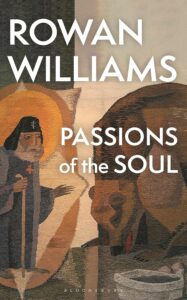Rowan Williams
Bloomsbury, 2024

I ought to recommend this book. It is from a deep, creative, spiritual theologian, opening our minds to some of the rich wisdom of Eastern theologians compiled in the Philokalia.
I can’t really recommend it because I am a surface thinking, uncreative, not very spiritual person, who struggled to grasp much of it.
Some of the writing is clear and helpful.
For example, not to fill our minds with things that will never satisfy:
“If you try and conquer boredom by fantasy, by building up satisfying pictures of yourself, by nostalgia, resentment, wistfulness for the person you might have been … you will ultimately be choosing fiction over truth.” (Page 29).
We should, instead, be more aware of our dependence on God:
“the freedom to say to God, ‘I acknowledge my pain, my sense of loss … I bring it to you … Christ suffers once and for all. Christ presents the pain of the world before God in the heavenly sanctuary … We mourn with him; we lament for our sin and the sin and grief of the world, and we express in that mourning our trust in Christ’s freedom to be alongside all suffering and to transfigure the damaged world.” (Page 31).
On sex:
“sexual desire, says Cassian, is given to us for a perfectly straightforward reason. Like every other Christian in his age, he thinks it is entirely about procreation; and modern readers will undoubtedly want to argue the point and insist that something broader is involved in terms of building and sustaining life-giving relationships. But the argument still has force. There is a fundamentally creative and mutual or relational impulse that is thrown off balance when the only motivation I recognize is the urge that I be satisfied, as fully and as promptly as possible. This is the point at which we begin to speak of lust rather than desire.” (Pages 55-56).
On not relying on our own strength:
“Do we secretly believe we have the resources to make and remake ourselves alone? Or do we know that the rise and fall of our breathing is, literally and metaphorically, the business of God’s Holy Spirit? Poverty of spirit, the acknowledgment of our dependence, is our richest resource, our final security; to know that we are creatures is the path to sharing the joy of the creator.” (Pages 74-75).
There was also plenty of writing, well over my head, for example:
“Yet (as John’s theological commentaries on the poetry amplify) the spirit’s experience in absence, in the darkness of not knowing who or what it is when deprived of the erotic affirmation given by the Saviour, confirms the spirit more deeply in the place of a Christ whose work reaches its climax in the experience of absence – of desire confronted with inescapable death.” (Page 96).
As comedian Peter Kay would say, “what’s all that about?”
May 2024
Adrian Vincent.